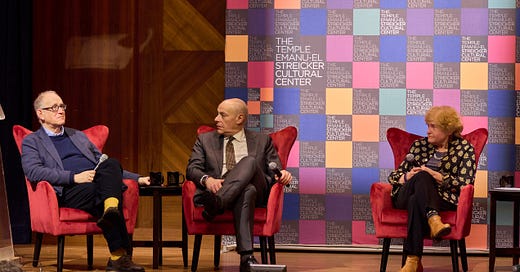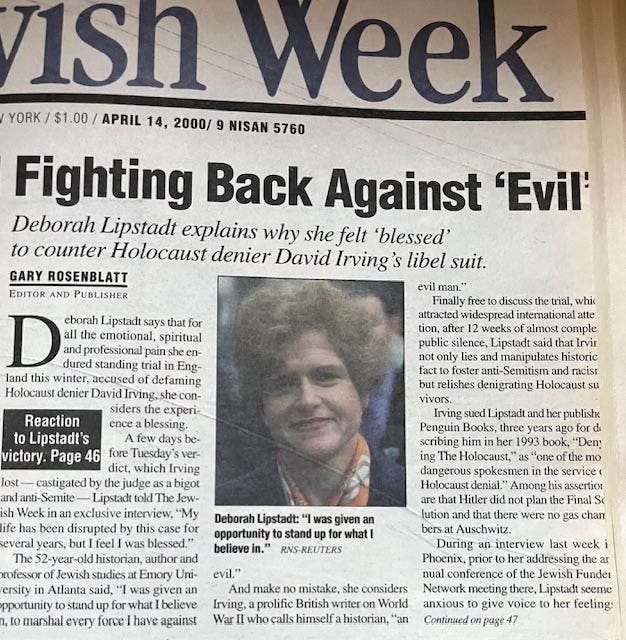25 Years Later, Holocaust Denial Still Demands Action
Reflecting on an historic 2000 court victory in London, historian Deborah Lipstadt asserts anti-Semitic words and deeds threaten not just Jews but democracy itself.
Looking back, looking ahead: Anthony Julius, James Libson and Ambassador Deborah Lipstadt at The Temple Emanu-El Streicker Cultural Center on February 25. Photo courtesy of Mishcon de Reya.
In early April 2000, after a month-long libel trial in London that attracted global attention, Deborah Lipstadt had her memorable day in court – a victory that continues to resonate in a world that, shockingly, is reeling from a level of anti-Semitism and hatred of Israel that was unimaginable until now.
It was on April 11, 2000 that a British judge definitively vindicated Emory University historian Lipstadt in her defense of accusations that she libeled British historian David Irving by calling him a Holocaust denier in her 1993 book, “Denying The Holocaust: The Growing Assault on Truth and Memory.”
In his 349-page opinion, Justice Charles Gray determined that Irving was “a falsifier of history… an active Holocaust denier” and that “he is anti-Semtic and racist.”
The day before the dramatic announcement, Lipstadt, in an exclusive interview with The Jewish Week, told me that though her life had been disrupted by the case for several years, “I feel I was blessed,” adding: “I was given an opportunity to stand up for what I believed in, to marshal every force I have against evil.” And she clearly stated that Irving, a prolific British writer on World War II who called himself an historian, was “an evil man.”
Lipstadt and her legal team cited and disproved numerous examples of Irving’s deliberate attempts to falsify information about the Holocaust, like presenting Hitler in a favorable light and insisting there were no gas chambers at Auschwitz. “We hoisted him on his own petard,” she told me.
Almost 25 years later, Lipstadt, who was appointed by President Biden and served a three-year stint as U.S. Special Envoy for Monitoring and Combating Anti-Semitism, reflected on the case and its impact at the Streicker Center in New York last Tuesday evening. She was joined by two chief members of the British legal team that defended her pro bono in the case, Anthony Julius and managing partner James Libson of the international law firm Mishcon de Reya.
Abe Foxman, who was national director of the Anti-Defamation League for 28 years, moderated the program that focused on the successful strategy to destroy Irving’s credibility, the different form of anti-Semitism that prevails today and the imperative to counter it.
At the outset, the panel noted that in British cases of defamation, unlike in American law, the onus is on the defendant to prove one’s innocence. The options for someone sued for defamation are to seek an out of court settlement or fight the charges. Lipstadt acknowledged that if not for Julius and Libson’s advice, she may well have chosen to settle. As Foxman noted, the ADL often avoided going to court over such cases for fear of losing and giving deniers of history credibility. “But I couldn’t see myself looking a survivor in the eye,” Lipstadt said, if she didn’t at least try to defeat Irving in court. So she and her legal team spent several years doing extensive research and building a case based on proving beyond a doubt that Irving was an unreliable and purposefully dishonest historian.
That’s why though a number of Holocaust survivors in England sought to testify at the trial, Lipstadt and her legal team decided to forgo calling on them. It was a tough decision, given their empathy for the survivors, but it was based on the belief that the legal team did not need to prove the Holocaust happened. Rather, they needed to focus on Irving’s willful distortion of reality, like asserting that Hitler did not know about the extermination of Jews .
“We had to destroy his reputation,” noted Julius, who is also a professor of literature, historian on British Jewry and was Princess Diana’s divorce lawyer. One psychological strategy, he said, was to give Irving “no respect from beginning to end. I never shook his hand. I never spoke to him. I refused to treat him with any dignity; he didn’t deserve it.”
Lipstadt, who read Irving’s diary, said his “overt hatred of Jews was overwhelming. He was the most dangerous of deniers.”
In the end, Irving lost the case, and though he never paid the several million dollars he was ordered to reimburse Penguin Books, Lipstadt’s publisher and partner in the proceedings, for trial costs, he was forced to declare bankruptcy. He moved to Austria and in 2005 was convicted there for violating a national law prohibiting Nazi activities, serving one year of a three-year sentence. In the Austrian court he admitted that “the Nazis did murder millions of Jews.” But after his release from prison and ban from ever returning to Austria, he continued to seek opportunities to lecture around the world, insisting that “Hitler was the best friend the Jews had in the Third Reich.”
Front-page news: Exclusive Jewish Week interview with Deborah Lipstadt just prior to the public announcement of the verdict in her London trial in April 2000.
‘Soft Core’ Denial Is Prevalent Today
David Irving’s claim to being an historian has been thoroughly repudiated, and the story of Lipstadt’s courage in fighting his allegations has been advanced in a subsequent book she wrote about the ordeal, “History On Trial: My Day In Court With A Holocaust Denier” (2005) and a popular movie based on the trial, “Denial” (2016). Yet when the panel turned to discuss the current post-October 7 world, Abe Foxman asserted that “Holocaust denial is alive … and rampant, as if the Irving trial never happened.”
Lipstadt sought to distinguish between two different types of Holocaust denial, “hard core” and “soft core,” deliberately using language that resonates with a different form of pornography. She said there is far less hard core denial today, like saying the Holocaust never happened, because such allegations are easy to counter with facts. More widespread and more troublesome, she said, is soft core denial, like claims that “the Jews brought it on themselves” or were just motivated by reparations. She described this type of denial as “squishy” because it is more subjective.
Julius said the problem today is not Holocaust denial but the inversion of it, using Holocaust language against Jews, like calling Israelis“Nazis.” This is “exceptionally painful, with Jews fighting for their lives [in Israel] and accused of genocide.” He noted that “anti-Semites only have to win once [in court] while we have to win every time. And we have to go on fighting [the untruths] every time.”
James Libson, Julius’s law partner, called for “a new methodology to fight a new form of anti-Semitism.” And Foxman pointed out that a major difference between the Irving trial and today is that “25 years ago, truth was the element that worked for us. Truth prevailed then. Now there is no truth,” he said, no universal acceptance of what is a fact and what is truth, though the panelists all said they have faith that the truth still holds in a court of law.
Lipstadt, citing her experience as ambassador the last three years in seeking to identify and combat anti-Semitism around the world, said “what still confounds me is how many people don’t understand anti-Semitism or take it seriously, or say it’s something that concerns Jews,” but don’t realize that it is “a threat to democracy and the rule of law, not just the Jews.”
Though her mandate was to deal with anti-Semitism in other countries, she addressed the sad state of American universities where many Jewish students feel unsafe. (In an essay in The Free Press a few days later, Lipstadt wrote that she had been considering an offer to teach at Columbia University next year as a visiting professor, but after seeing how anti-Israel disruptions at Barnard last week were permitted with little action by the administration, she is “now convinced that to do so would be folly.”)
At evening’s end, Lipstadt recalled a comment made to her recently by a former prime minister of France at a conference they attended in Paris and which she found quite moving. “France without Jews would not be France,” he told her. She closed by reiterating that if any group in a society does not feel safe, it hurts the whole society, and the fact that many American Jews today, on campus or elsewhere, are experiencing anti-Semitism is like “the flashing amber light before it turns red” at a traffic light – a sign that our society is in danger.





